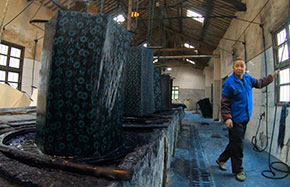A salute to the nation by proud youngsters
Huo Can carries the national flag and practices marching on parade, swinging her arms in a shady corner of the playground.
The 13-year-old national flag bearer at Zhuangyuan Military School in Shijiazhuang, capital of Hebei province, usually practices before the weekly flag-raising ceremony.
"Members of the school's flag guards will go to Beijing to watch the flag-raising ceremony held at Tian'anmen Square next month," she says. "We may even meet our instructor. I want to practice more and never let him down."
Two years ago, Zhao Xinfeng, the former squad leader of Tian'anmen's national flag guards, was invited by the junior military school to train 36 pupils to raise the national flag - the same number as the national flag guard at Tian'anmen.
Pupils at the paramilitary school follow the same curriculum as ordinary schools, but "they seldom pound the books all day," says Yu Hongli, the school's headmistress, adding students are offered instead daily military training and classes.
With the 90th anniversary of the founding of the Communist Party of China drawing near, nearly 800 schools in the province are organizing activities to inculcate a sense of patriotism among students.
"It is hard for youths to have a sense of patriotism, so schools want to inform the younger generation, especially children born under the family planning policy, how important perseverance is for both individuals and the country, through interesting army experiences," Yu says.
During the one-week training course, Huo and her teammates learn to stand at attention, parade and fold a flag.
"I was very tired, no wonder there are no female national flag guards in Tian'anmen. But I stuck to the task, as it was an honor," says the 1.7-meter tall girl, who received a flag badge from Zhao after completing training.
She wears it at the weekly flag raising ceremony and presents her perfect parade ground march in front of 1,000 students.
Meanwhile, the 23rd Middle School in Shijiazhuang has opened a national defense exhibition hall displaying models of weapons and multimedia presentations.
Huaxia Primary School has included recreational games into its educational program, including puzzles and chess, to learn the history and culture of Shijiazhuang.
To enable students to get a feel for life in the Red Army, Hequ Junior School takes students on trips to Xibaipo Memorial Museum, a national educational base.
The children are fascinated by tales of how plain trolleys became powerful tools and helped the CPC beat 1.54 million enemy troops; and learn about how Communist International allies ate chili dishes with former chairman Mao Zedong.
Simulated battlefields produced by sound and light shows give the kids an idea of what it must have been like at the time.
"The vivid show can inspire them and enhance their awareness of national defense," says Wang Lirong, curator of the museum.



























